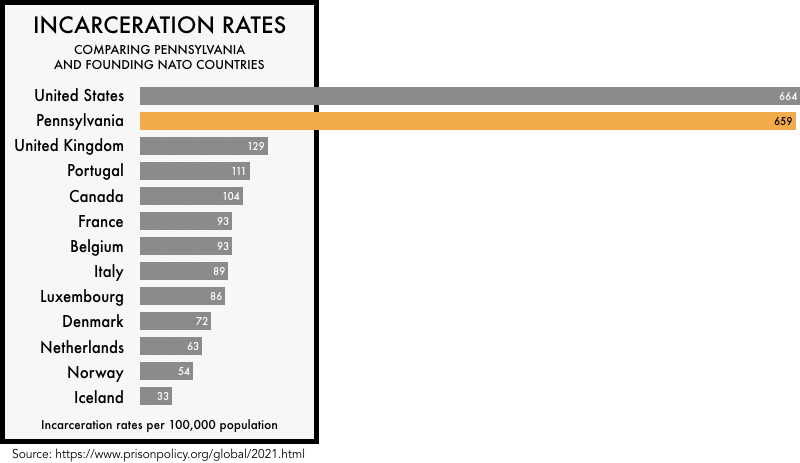Global Justice Advocacy, from Philly: Legal Experts Kick Off CPGC Fellowships

Pictured: speakers Saleem Holbrook (left), and Vince Warren ('86).
Details
Haverford’s Center For Peace and Global Citizenship is thrilled to welcome groundbreaking justice advocates, executive director of the Center for Constitutional Rights, Vince Warren (86’), and executive director of the Abolitionist Law Center, Saleem Holbrook, to campus as part of the CPGC’s Spring 2024 kickoff for students selected for summer fellowships. Their collective work has aided an evergrowing network of prison reform work, now taking the international stage.
Haverford’s Center For Peace and Global Citizenship is thrilled to welcome groundbreaking justice advocates, executive director of the Center for Constitutional Rights, Vince Warren (86’), and executive director of the Abolitionist Law Center, Saleem Holbrook, to campus as part of the CPGC’s Spring 2024 kickoff for students selected for summer fellowships.
Warren and Holbrook have served as collaborators on the international campaign to end death-by-incarceration (DBI), a movement born through solidarity among people incarcerated in Pennsylvania prisons and human rights advocates outside of the prison system. They will appear together at 6:30 pm in Sharpless Auditorium on April 11. Additional details, including zoom options, appear below.
While mass incarceration is a national crisis, it is particularly acute in the state of Pennsylvania

Strict sentencing minimums and aggressive policing practices across the state have contributed to Pennsylvania’s uniquely high juvenile carceral rates. Seeing this situation develop at the ground level, men incarcerated in Pennsylvania in the late 90's initiated a unique network of prison reform activism. They were inspired by political prisoners of the Black Panther Party and Black Liberation Army who entered the Pennsylvania prison system in the 1970's and who centered human rights in their resistance to state violence.
These influences led to organizations like the Human Rights Coalition that Holbrook co-founded in 2001 while at SCI-Huntingdon and Right 2 Redemption that Kempis Ghani Songster co-founded in 2011 at SCI-Graterford. Both Holbrook and Songster were mentored by political prisoners in the Pennsylvania prison system. And both HRC and R2R advocated for the sentence of death by incarceration to be addressed as a violation of human rights under International Law. In 2021, this culminated in the Abolitionist Law Center, Amistad Law Project, Center For Constitutional Rights, Release Aging People in Prison, Right To Redemption and several other human rights organizations collaborating on a petition presented to the United Nations Human Rights Committee in Geneva, charging the United States with violating the human rights of people serving death by incarceration sentences. As a result of this organizing, for the first time ever, the committee recommended that the United States “establish a moratorium on the imposition of sentences to life imprisonment without parole.”
As Haverford College prepares to embark on collecting and mobilizing relevant oral histories through the Graterford Archive Project, Creative Director Akeil Robertson highlighted the explosive effects of the abolitionist study and practice advanced inside PA prisons. As long ago as when the Nixon-era War on Drugs incited a new era of mass-incarceration, incarcerated people nationally began confronting the oppressive structures to which they were subject. During that era, Robertson said,
“Everyone started becoming a bit more radical in their thinking as the impossible structures of otherization that once seemed insurmountable began to crumble. Oppressed people the world over began to rethink what they could achieve and how they should go about doing it; the men who studied at Graterford were no exception. Their efforts benefitted from a structure which allowed for study outside of the traditional antagonisms in other spaces. This semblance of freedom allowed the men there to create structures and programs that honed their skills as organizers and political actors in novel ways.”
As individuals were transferred to other institutions around the region, they carried the political model and possibility Graterford afforded them along for the ride.
Without the vision and determination of men incarcerated at Graterford and elsewhere in the PA prison system, the campaign to end life by incarceration may not have made it to Geneva. Across the same era, on the Haverford College campus during the 1980s, Vince Warren was a key leader in the movement to divest from South Africa during that country’s Apartheid government. Beyond Haverford, Warrens' career led him to civil rights work on both domestic and international scales, serving as a member of the South African Truth and Reconciliation oversight committee, a senior staff attorney at the ACLU, and defense attorney for Brooklyn’s Legal Aid Society. His commitments echo the core values of Haverford’s CPGC in bridging local and global human rights work, engaging in critical analysis and action on both small and large scale initiatives.
While Warren attended Haverford College and went on to law school at Rutgers, Holbrook studied law and abolitionist practice during his imprisonment at Graterford and across the PA prison system. Despite extraordinarily different experiences in their late teens and twenties, Holbrook and Warren’s lives began to sync in more recent years. This past year, Warren taught law students at the City of New York Law School, while Holbrook taught law students at the University of Pennsylvania. Together, they visited Geneva as part of global legal activism to end Death by Incarceration in the State of Pennsylvania and across the United States.
Activist networks often struggle to link insights from people most affected by injustice with national and global advocacy/policy development, but Warren and the CCR have made forging such alliances central to their practice. In the process of developing a series of shadow reports to the UN, Warren collaborated with a committee of activists working on the ground, within carceral systems. One committee member was Holbrook.
Warren began to learn how Holbrook dedicated himself to decarceral efforts, against extraordinary odds. Sentenced to die in prison at just 17 years old, Holbrook served 27 years behind bars before a supreme court ruling banning life sentences for minors ultimately created a pathway to freedom. Since his 2018 release, Holbrook’s activism has been rooted in the Philadelphia area, directing the Human Rights coalition (which he co-founded while incarcerated), guest lecturing at Penn Law, being named as Philadelphia’s Citizen of the Year, and continuously serving as an advocate for those still incarcerated.
Warren and Holbrook are each vital nodes in a vast network of organizers, activists, lawyers, scholars, and everyday citizens who are amplifying concerns about mass incarceration, forwarding specific policy solutions, and developing alternatives to the status quo.
Their presentation, When Power Runs against Justice: Turning the Tide, will take place in Sharpless Auditorium and via Zoom, from 6:30 - 7:30 pm on April 11. Register for the Zoom Webinar here.
*Special thanks to Akeil Robertson for his assistance and wisdom in developing this piece.
Additional References




